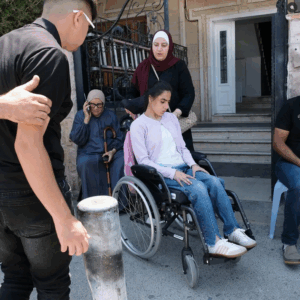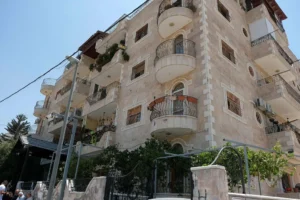140 Palestinians are about to lose their homes. The reason, they say: the Mufti once lived here

Ayesha Fawad, a resident of the building, in a wheelchair, alongside her neighbors.
Gideon Levy reports in Haaretz on 2 August 2025:
It’s a relatively new apartment building, on the Mount of Olives in East Jerusalem. Five floors, 17 apartments, with rounded balconies, an elevator and a stone facade. Through its windows one sees a landscape that features the Wadi Joz neighborhood, the Mount Scopus campus of the Hebrew University, the local branch of the Mormons’ Brigham Young University and Beit Orot Yeshiva. It’s a well-kept building, with middle-upper class residents.
This week, a few gloomy-looking men were sitting in plastic chairs on the street in front of the building. Barring a last-minute change, their homes will be demolished in the coming days, leaving its 140 residents homeless and indigent. They know now that the bureaucracy involved in the construction of the building was faulty, that not all the necessary authorizations were obtained.
But they’ve lived here for more than 20 years and until recently were sure the building would be retroactively legalized. The requisite procedures were already well underway, they say. Besides there are literally thousands of illegal structures in East Jerusalem that no one is demolishing.
The only reason this building has been singled out, the occupants are convinced, is the identity of the person who until a few months ago rented a ground-floor apartment – Sheikh Ekrima Sabri, 86, who served as the mufti of Jerusalem from 1994 to 2006. Far-right Jewish organizations are apparently intent on razing the structure because of the one-time tenant, the most important Muslim figure in the city and supervisor of Islam’s holy sites there, in apartment No. 1. Right-wing activists have demonstrated there more than once recently, cursing the sheikh and threatening to demolish the building.
Last week, a notice was affixed to the door of every apartment: “To the residents of the building File No. SH 932: The National Unit for Enforcing Planning and Construction Laws hereby announces that it intends to carry out a demolition according to the decision of the court. To reduce damage, you must vacate every person and object from the structure referred to in this order by July 26, 2025! The state will not be responsible for property damage if said building is not vacated as specified.”
After the Jerusalem District Court authorized the demolition, the apartment owners appealed to the Supreme Court, which issued a stay of proceedings order pending receipt of the state’s explanation for its plan. Meanwhile, Justice Khaled Kabub gave the government until August 7 to respond.
The reaction of the right-wing groups was to target Kabub in the media, claiming that they had found a connection between him and the former mufti. On July 24, Hakol Hayehudi (The Jewish Voice) website, which describes itself as an “independent” outlet, alleged that Kabub had in the past received a certificate of merit from Ekrima Sabri in recognition of the work of the justice’s family on behalf of Islamic sites in Jaffa, where he lives.
“The conflict of interest cries out to the heavens,” the site asserted, explaining that “Sabri is the representative of the Iranian axis of evil in Jerusalem and for years has incited for the murder of Jews, has expressed support for suicide attacks and took part in an assembly on Iran’s Al-Quds [Jerusalem] Day.”
Meanwhile, Lavi, a nonprofit that aims “to strengthen Jewish and Zionist identity,” described Sabri as the “scourge of the Jews.” And the ultranationalist Im Tirzu organization declared: “Justice Kabub is one of the greatest stains on the Supreme Court.”
That’s what happens when there’s an Arab justice, just one, sitting on the bench of the land’s highest court.
In the past, the National Unit for Enforcing Planning and Construction Laws (formerly the National Unit for Construction Inspection) was part of the Interior Ministry. In 2015 it was transferred to the Finance Ministry, and in June 2024 to the National Security Ministry, headed by Itamar Ben-Gvir. The irony is that the same person who supports the illegal, wild and disorderly construction of settlements and outposts in the territories – even more intensively since October 7 – is in charge of “enforcing planning and construction laws.” The transparent target is of course the Palestinian population of Israel, which generally cannot build legally in any case, in the absence of master plans and building permits that the state refuses to provide.
The irony is that Ben-Gvir, the same person who supports the illegal, wild and disorderly construction of settlements and outposts in the territories – even more intensively since October 7 – is in charge of ‘enforcing planning and construction laws.’
Construction of the building at 70 Al-Sawana Street was completed in 2003 – 17 apartments of 140 square meters (1,506 square feet). After moving in, residents say, they discovered that there was no building permit, but the contractor assured them that it was pending. Two years later, the contractor, Awad Abu Qwaidar, moved to Egypt, whereupon the group embarked on a lengthy legal campaign to have the structure legalized.

The building in East Jerusalem that’s slated for demolition
The process was at its height, they say, but October 7 put paid to that, too. The tenant Sabri, who has given Friday sermons in the Al-Aqsa Mosque, on the Temple Mount, delivered a sharp anti-Israeli speech six days after October 7. The right-wing camp declared war on Sabri. The transfer of the governmental unit that demolishes Arab structures to the National Security Ministry has only stoked the flames. The people living in the building, by the way, were certain even this week that the battle against them is being waged by the Jerusalem Municipality – which is not actually the case.
The legal explanations are complicated. We’ll hear the position of the national enforcement unit next week, in the Supreme Court, but in the meantime representatives of 140 people are sitting in the street, deeply anxious about their future. Apartments are expensive in East Jerusalem; no one here, they assert, can afford to buy another home.
Where will they go? Yusuf Abu Hamad, 60, who lives in the building with his children and grandchildren, 10 people in all, says, “We are asking for a little pity. They are inciting against us and we want them to look at us with compassion. As human beings. For them to help us. Not to take revenge on us because of the sheikh, who moved to Beit Hanina [another East Jerusalem neighborhood].”
“May God have mercy that they will not evict us,” Abu Hamad continues. “We don’t even have the means to rent apartments, and we are asking for help to legalize the building. We are also requesting that the international community lend a hand and use its influence to halt the demolition. We are human beings, we are residents of Israel, and we are appealing to anyone who can help.”
On Jerusalem Day this year, a procession set out from Beit Orot Yeshiva, not far from the apartment building, and the participants loudly cursed the mufti. A video shows them singing and dancing, holding Torah scrolls, in the exact spot where the distraught tenants are now sitting. “Son of a bitch,” shouted the demonstrators, all of them dressed in white – to mark the sacred festival of the liberation of Jerusalem, of course.
Issa Sharbati, a journalist of 55 who lives in the building with his parents, his wife and their four children, notes that in all his years of covering home demolitions in East Jerusalem, never has a building of this size been earmarked for razing. He too is convinced that it’s because of the former mufti: The demolition is punishment for his sermons.
Nidal Jubran, 55, who has five children and two grandchildren, is one of the heads of the house committee. The day after the sheikh’s sermon in Al-Aqsa, after October 7, he relates, inspectors came to the building and informed the occupants that it was due to be destroyed.
In making their case, residents note that the Nairoh family, on the second floor, has three special-needs children, where will they go? Jubran: “All the occupants are innocent of any wrongdoing. Everyone wants to live in peace. We have nowhere to go if the building is demolished. If the mufti hadn’t lived here, they wouldn’t have come anywhere near us. There are many illegal buildings, and they get legalized.”
In the meantime, the group of dejected men is sitting outside, counting down until their lives are totally upended.
This article is reproduced in its entirety
